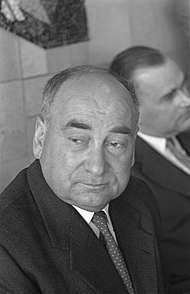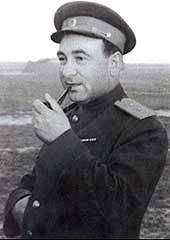Panteleimon Ponomarenko
| Panteleimon Ponomarenko | |
|---|---|
 Ponomarenko in the Netherlands, 1959 | |
| First Secretary of the Communist Party of Kazakhstan | |
|
In office 6 February 1954 – 7 May 1955 | |
| Preceded by | Zhumabay Shayakhmetov |
| Succeeded by | Leonid Brezhnev |
| Minister of Culture | |
|
In office 15 March 1953 – 9 March 1954 | |
| Premier | Georgy Malenkov |
| Preceded by | Nikolai Bespalov |
| Succeeded by | Georgy Aleksandrov |
| Minister of Procurement | |
|
In office 27 October 1950 – 12 December 1952 | |
| Preceded by | Boris Dvinskiy |
| Succeeded by | Nikolai Ignatov |
| Chairman of the Council of Ministers of the Byelorussian Soviet Socialist Republic | |
|
In office 7 February 1944 – 17 March 1948 | |
| Preceded by | Ivan Bylinsky |
| Succeeded by | Aleksey Kleshchev |
| First Secretary of the Communist Party of Byelorussia | |
|
In office 18 June 1938 – 7 March 1947 | |
| Preceded by | Aleksei Volkov |
| Succeeded by | Nikolai Gusarov |
| Candidate member of the 19th Presidium | |
|
In office 5 March 1953 – 14 February 1956 | |
| Full member of the 19th Presidium | |
|
In office 16 October 1952 – 5 March 1953 | |
| Member of the 18th, 19th Secretariat | |
|
In office 1 July 1948 – 5 March 1953 | |
| Personal details | |
| Born |
9 August [O.S. 27 July] 1902 Kuban Oblast, Russian Empire |
| Died |
18 January 1984 (aged 81) Moscow, Soviet Union |
| Resting place | Novodevichy Cemetery, Moscow |
| Nationality | Soviet |
| Political party | Communist Party of the Soviet Union |
| Alma mater | Moscow State University of Railway Engineering |
| Signature |
|
Panteleimon Kondratyevich Ponomarenko (Russian: Пантелеймо́н Кондра́тьевич Пономаре́нко, Ukrainian: Пантелеймо́н Кіндрáтович Пономарéнко; 9 August [O.S. 27 July] 1902 – 18 January 1984) was one of the leaders of Soviet partisan resistance in Belarus.[1][2][3] He also served as an administrator at various positions within the Soviet government, including the leadership positions in Byelorussian and Kazakh SSRs.
Early life
Ponomarenko was born in khutor Shelkovskiy in Kuban oblast to an ethnic Ukrainian peasant family coming from Kharkov governorate.[1][4] He fought in the Russian civil war and became a member of the Communist party in 1925.[1]
Career
As the head of Belarus
From 1938 to 1947, Ponomarenko was the First Secretary of the Communist Party of Belorussia,[1] and from 1944 to 1948, also the Chairman of the Council of Ministers of Belarus. During the Great Purge he successfully defended Belarusian-language poets Yanka Kupala and Yakub Kolas from repressions, personally travelling to Stalin to appeal for their protection.[1][5][6] The two poets were later awarded the Order of Lenin.[1]
During this time he also assisted the National Jazz Orchestra in Minsk, inviting Eddie Rosner to lead it.[7][8]

During World War II
During World War II, he was one of the leaders of the Communist partisan units within Nazi-occupied Belarus.[1][2][3] He was granted the rank of Lieutenant general in March 1943.[3]
According to the Polish Institute of National Remembrance, during that time he also clashed with the Polish underground and gave orders for his troops to disarm them and execute their officers.[9] In this aspect, the institute claims, the forces under Ponomarenko's command initiated a limited collaboration with the Nazi occupation forces informing on members of the Polish underground.[9]
After the war
From 16 October 1952 until 6 March 1953, Ponomarenko was a member of the Politburo (called Presidium at the time) of the Communist Party of the Soviet Union.[10] He was made First Secretary of the Communist Party of the Kazakh SSR in 1954 before becoming the Soviet ambassador to Poland between 1955 and 1957.[11][12]
From 26 October 1957 to 22 April 1959 Ponomarenko was the Soviet ambassador to India and Nepal, and from 30 June 1959 to 21 June 1962 to the Netherlands.[13]
In his later years, Ponomarenko was a professor at the Institute of Social Sciences under the Central Committee of the CPSU between 1964 and 1974.[14]
References
| Wikimedia Commons has media related to Panteleimon Ponomarenko. |
- This article is based in part on material from the Polish Wikipedia
- 1 2 3 4 5 6 7 "ПОНОМАРЕНКО ПАНТЕЛЕЙМОН КОНДРАТЬЕВИЧ — информация на портале Энциклопедия Всемирная история". w.histrf.ru (in Russian). Retrieved 2018-09-26.
- 1 2 "Герои Победы: П.К. Пономаренко". www.portal-slovo.ru. Retrieved 2018-09-26.
- 1 2 3 Kandakova, Anastasia Yurievna. "Пономаренко Пантелеймон Кондратьевич" (in Russian). Belarusian Great Patriotic War Museum. Retrieved 2018-09-26.
- ↑ ГОМЕЛЬ. Энциклопедический справочник. 1991.
- ↑ "Пантелеймон Кондратьевич Пономаренко | Государственное управление в России в портретах". deduhova.ru (in Russian). Retrieved 2018-09-26.
- ↑ Добров, Владимир (2017-12-15). Тайный преемник Сталина (in Russian). Litres. ISBN 9785040947423.
- ↑ правды», Комсомольская правда | Сайт «Комсомольской (2008-05-14). "О судьбе великого джазмена Эдди Рознера сняли документальный фильм". KP.BY - сайт «Комсомольской правды» (in Russian). Retrieved 2018-09-26.
- ↑ Sputnik. "По минским местам Эдди Рознера: жизнь в стиле jazz". sputnik.by (in Russian). Retrieved 2018-09-26.
- 1 2 Bogdan Musiał. "Memorandum Pantelejmona Ponomarienki z 20 stycznia 1943 r. in: O zachowaniu się Polaków i niektórych naszych zadaniach". Pamięć i Sprawiedliwość (in Polish). Instytut Pamięci Narodowej (2006-09–01): 379. ISSN 1427-7476.
- ↑ "Руководство Коммунистической партии: Президиум ЦК: 1952-1956 - Praviteli.org". www.praviteli.org (in Russian). Retrieved 2018-09-26.
- ↑ Brown, Archie (1990) "Ponomarenko, Pantaleimon Kondrat'evich (1902–1984)" The Soviet Union: A biographical dictionary Macmillan Publishing Co., New York, ISBN 0-02-897071-3 ;
- ↑ Vronskaya, Jeanne and Chuguev, Vladimir (1988) "Ponomarenko, Panteleimon Kondrat'evich (1902–1984)" A Biographical Dictionary of the Soviet Union, 1917–1988 K.G. Saur, London, ISBN 0-86291-470-1 ;
- ↑ "00202". www.knowbysight.info. Retrieved 2018-09-26.
- ↑ Николай, Зенькович. "ПОНОМАРЕНКО Пантелеймон Кондратьевич - Самые закрытые люди. От Ленина до Горбачева: Энциклопедия биографий". www.e-reading.club. Retrieved 2018-09-26.